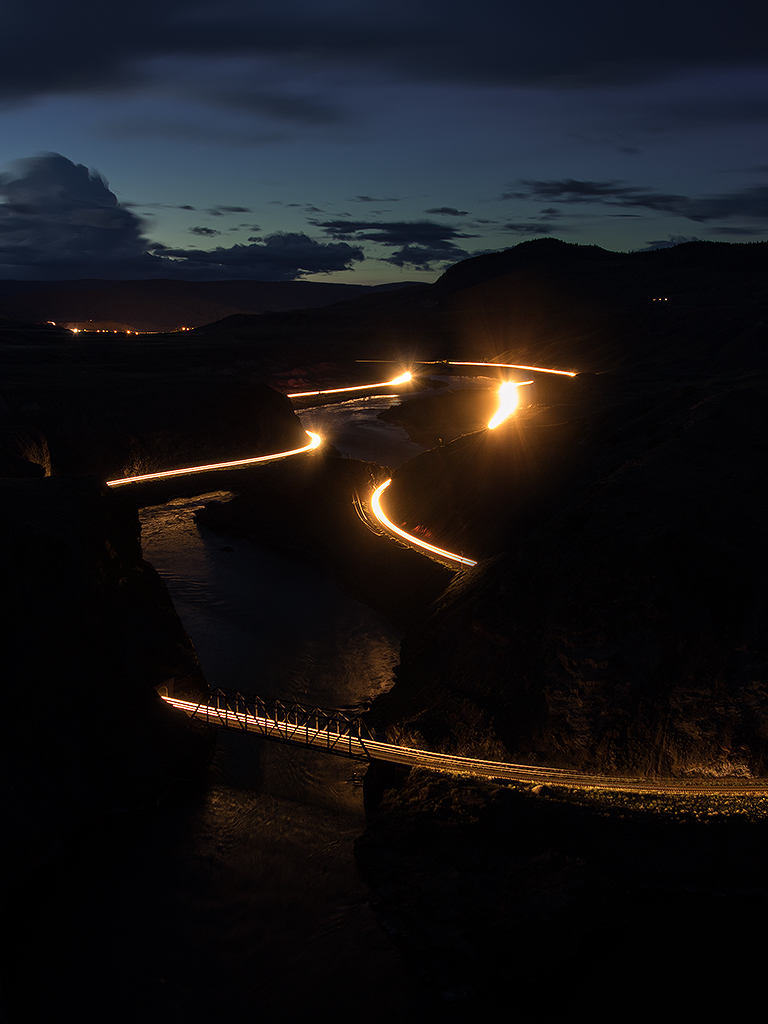
The Ashcroft (Black Canyon) train observation spot is a scenic location in British Columbia, Canada, known for its stunning views of trains navigating the dramatic landscapes of the Black Canyon. Nestled along the Thompson River, it offers a unique vantage point to watch trains traverse the rugged terrain.
Photos
Sign in to upload photos
No Photos Yet
Be the first to share photos of this location!
Ashcroft (Black Canyon) – Ashcroft, British Columbia, Canada | Train Spotting Location
Trainspotting Experience
From the rim of Black Canyon you stand almost level with the rails as they hug the river’s edge below. Expect to hear the locomotives well before you see them: deep turbocharged notes echo off the basalt walls, followed by the metallic rumble of hundreds of axles rolling over continuously welded rail. Curves are broad but pronounced enough that 12,000-ft trains present a satisfying serpentine profile. Speeds typically range between 35 – 45 mph as crews respect the canyon’s gradients and tight clearances, so you’ll have ample time to identify power consists and rolling-stock types. The relative quiet of the valley means even mid-manifest slack action and flange squeal carry clearly, adding an immersive soundtrack. Nightfall does not end the show; EOT markers float like red fireflies through the dark canyon, and the amplified exhaust against the rock walls makes after-hours listening worthwhile for anyone staying nearby.
Landscape, Setting & Local Atmosphere
Black Canyon lies in British Columbia’s Interior Plateau, a semi-arid landscape more reminiscent of the American Southwest than coastal Canada. Sagebrush, bunchgrass, and scattered ponderosa pines cling to sandy benches above the river, while columnar basalt cliffs burn orange in low sunlight. Elevation at rail level sits around 240 m (790 ft); the opposing canyon wall climbs sharply to over 500 m, creating a natural amphitheater that focuses light and sound. Summer days are hot and dry—temperatures frequently top 30 °C—yet evenings cool rapidly as katabatic winds flow down the valley. Winter brings crisp, mostly snow-free conditions, and the muted palette of frost-tipped sage can be striking against bright multicolored hopper trains.
Type & Frequency of Train Activity
Ashcroft is part of the directional-running agreement between Canadian National and Canadian Pacific. The visible trackage here is CN’s Ashcroft Subdivision, carrying predominantly westbound traffic bound for the port of Vancouver. On an average weekday 20–25 CN freight movements pass, joined by a similar number of CP eastbounds across the river, easily visible from most vantage points. Trains include stacked intermodal blocks, export grain drags, unit coal, potash, sulfur, and mixed manifests; hotshot intermodal sets often feature Distributed Power Units mid-train or on the rear. Power is dominantly GE ES44AC/W or ET44AC, plus SD70ACe and occasional leased units. Passenger action is limited but notable: VIA Rail’s westbound “Canadian” (train 1) rolls through roughly three times a week, usually led by F40PH-3 or Siemens SCV-42 sets, its stainless steel cars glinting in the desert sun.
Best Angles for Photos & What Railfans Enjoy Most
Photographers favor the elevated gravel pullouts that give a 3/4 perspective looking downriver: morning side-lighting illuminates the nose of westbounds, while afternoon backdrops place trains against sunlit canyon walls. A 70–200 mm lens frames full locomotives with river reflections; wider 24–35 mm shots capture sweeping S-curves and foreground sage. Across the river, CP traffic provides layered images with two trains in the same frame—one climbing, one descending—particularly effective near golden hour when cliff faces glow. Mid-summer sunsets behind the rim produce dramatic silhouettes, and clear winter air yields razor-sharp detail with snow-capped Coast Mountains faint on the western horizon.
Historical or Cultural Relevance
The line forms part of Canada’s original 1915 CN mainline, engineered to pierce the rugged Fraser-Thompson corridor and shorten coast-to-interior transit. Black Canyon required significant rock-bolting and hand-cut ledges; remnants of early 20th-century cribbing still support sections of roadbed. Nearby Ashcroft thrived as a division point during the steam era, servicing helper locomotives that fought grades east of town. The locale also intersects Nlaka’pamux First Nation territory, whose traditional fishing sites along the Thompson pre-date the railway by millennia, lending cultural depth to the modern rail scene.
What Makes This Spot Different
Few Canadian locations combine double-mainline volume, opposing railroad ownership, desert scenery, and excellent natural acoustics in one easily viewable package. Unlike busier urban hotspots, Black Canyon offers an uncluttered foreground—no fences, catenary, or industrial sprawl—so every frame centers on trains and nature alone. The ability to watch both CN and CP fleets simultaneously, separated only by the river, provides a comparative study of motive-power rosters and operating practices that is hard to replicate elsewhere in the country.
Localisation
Coordonnées :50.665180, -121.311579
Seasonal Information
For Ashcroft (Black Canyon) in British Columbia, spring and fall offer mild weather and vibrant scenery, ideal for train watching. Summer provides long daylight hours, while winter offers picturesque snowy landscapes. Check local rail schedules for special excursions and plan for potential weather impacts.
Other Interesting Locations
Looking for more spots? Browse the complete list of train spotting locations.
Quick Information
Country
Canada
Region / State / Province
British Columbia
City
Ashcroft
Spot Type
Scenic Overlook
Best Times
The best hours to observe trains at Ashcroft (Black Canyon) are during daylight, especially morning (7-9 AM) and evening (5-7 PM) peak times.
